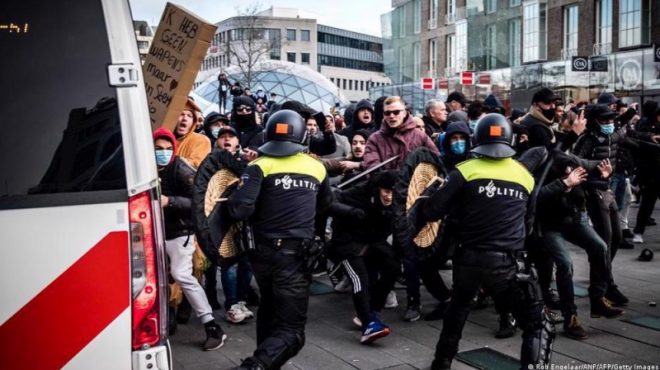Protests against COVID-19 vaccine requirements have gathered momentum across western Europe with large demonstrations taking place in France, Denmark, Germany, and Austria, among other countries.
More than 100,000 protesters took part in rallies in France to decry controversial government plans to restrict the rights of the unvaccinated and to denounce recent remarks made by President Emmanuel Macron.
According to the French Interior Ministry, over 105,000 people took part in countrywide rallies, with 18,000 of them taking to the streets in Paris, where police reported 10 arrests and three injuries.
Protesters in the French capital, most of them without masks, braved intense cold and rain on Saturday, carrying placards that read “Truth”, “Freedom” and “No to Vaccine Pass.”
Participants denounced Macron’s remarks made last week, saying his government’s COVID-19 vaccination strategy was intended to “annoy” the unvaccinated and making life harder for them.
“I am not about annoying the French people, but as for the non-vaccinated, I really want to annoy them,” Macron said last Tuesday in an interview with Le Parisien daily. “And we will continue to do this, to the end. This is the strategy.”
The protesters reacted to Macron’s remarks, using the same words: “We’ll annoy you.”
The large-scale rallies in France came as the country recorded more than 300,000 COVID-19 infections in a single day on Friday.
The country’s parliament had on Thursday approved a government bill that requires individuals to prove they are fully vaccinated before they can eat out, travel on intercity trains or attend cultural events.
Protests in Belgium
In Belgium, thousands of protesters poured into the streets of capital Brussels on Sunday to oppose anti-coronavirus regulations.
The previous, relatively larger demonstrations in the Belgian capital were marred by violence. The protests led to pitched street battles with police, who used tear gas and water cannon to disperse the crowd.
As protesters marched through the city on Sunday, they chanted “freedom, freedom!” and brandished banners denouncing what they referred to as “vaccine dictatorship”.
Rage in Germany, Austria
More than 40,000 people also protested against vaccination measures in the Austrian capital Vienna, where vaccination against COVID-19 is due to become compulsory next month.
Local police officials, however, described the protest rallies as largely peaceful.
In Germany, protesters rallied in several cities on Saturday, with the largest demonstration taking place in Hamburg, where nearly 16,000 people took part, according to the police authorities.
The rallies in Germany were held under the banner “Enough! Hands off our children,” as the government mulls a general vaccine mandate and COVID-19 jabs to children between 5 and 11.
In Berlin, a coronavirus demonstration took the form of a car-and-bike convoy. Police counted more than 100 vehicles, 70 bikes and approximately 200 people in total.
German Health Minister Karl Lauterbach said the arguments made by vaccination opponents and coronavirus deniers had lost all measure and focus, insisting in an interview that “a small group is willing to wipe all scientific knowledge off the table and voluntarily enter a bubble of bogus truths.”
Protests in Italy, Denmark, and Netherlands
Protest rallies were also staged in Italy, with people in the city of Turin demonstrating against rules that make vaccines mandatory for anyone above the age of 50.
Tougher laws are also coming into force for others, effective Monday, as those who are unvaccinated can no longer use public transport or visit restaurants.
Nearly 1,000 people took part in anti-vaccination protests in the Danish capital Copenhagen led by an anti-COVID restriction radical movement called “Men in Black.”
Since early December, Denmark – where 63 percent of people over 18 have already received a booster shot – has recorded high numbers of new infections amid new restrictions.
Hundreds of protesters in the Dutch capital Amsterdam participated in fresh rallies on Sunday to voice their opposition to the country’s coronavirus measures.
Most public spaces in the country have remained closed since mid-December, when restrictions were imposed by the government in a bid to contain record number of coronavirus cases.
The lockdown had brought down the number of COVID-19 patients in Dutch hospitals to their lowest levels in two months but experts expect admissions to increase again due to rapid surge in infections.
 Alghadeer TV Alghadeer TV
Alghadeer TV Alghadeer TV

